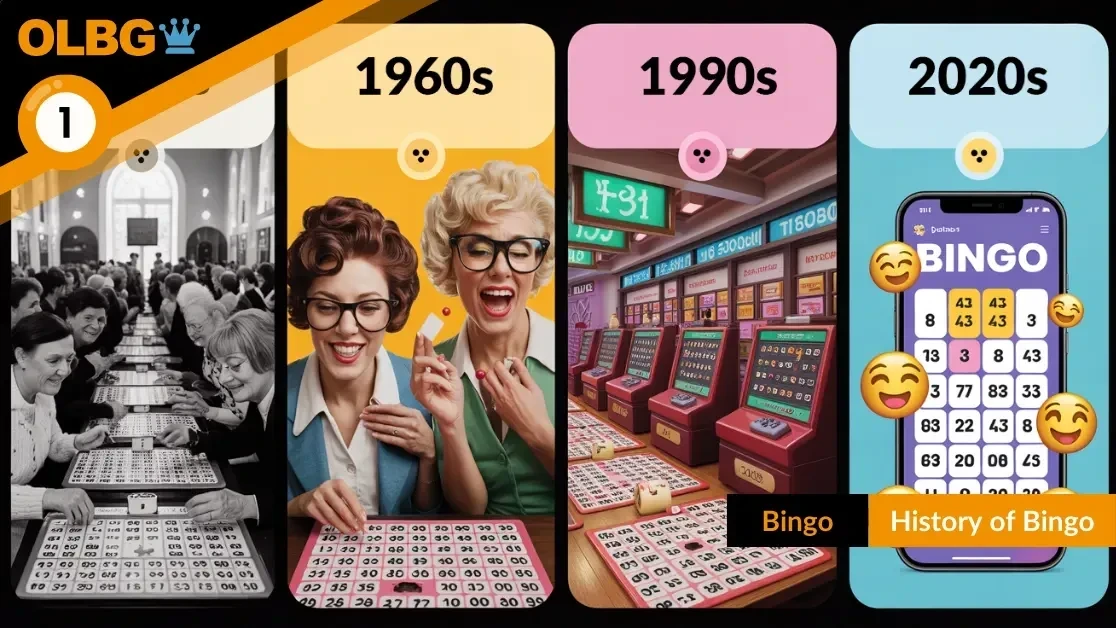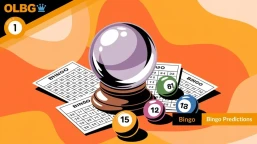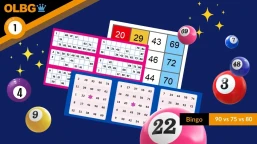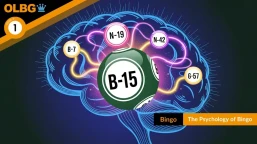Introduction
Bingo isn’t just a game – it’s a tradition. From wartime fundraisers to glittering bingo halls and now online rooms, it’s evolved with every generation.
In this guide, I’ll walk you through the fascinating history of bingo in Britain. You’ll discover how it started, how it became a national obsession, and how today’s bingo sites carry that legacy into the digital age.
Whether you're new or nostalgic, this journey connects it all – with a nod to bingo bonuses and how you can get involved today.
Bingo Today – Where to Play Online in the UK
Bingo may have deep roots in British history, but it’s also thriving right now in the digital world. If you're curious about trying it online, whether for nostalgia or to play a game, these trusted UK bingo platforms offer safe, modern and rewarding ways to play.
- Bingo variety with branded and progressive rooms
- 24/7 live chat that actually delivers
- Wide choice of bingo rooms and bingo variants
- Excellent welcome bonus
- Pragmatic Play bingo rooms with progressive jackpots
- Easy payments via PayPal, Google Pay & Trustly
Where It All Began
Before bingo reached British shores, its roots can be traced back to 16th-century Italy. Known as Il Gioco del Lotto d’Italia, it was a weekly lottery-style game. The format spread to France and Germany, where it evolved as both entertainment and education.
In the 1920s, Americans adopted a version called Beano. Legend has it that a toy salesman named Edwin Lowe overheard someone accidentally shout “Bingo!” instead – and the name stuck.
But the game’s real story? That started right here in Britain. 🇬🇧
🏡 Bingo in Britain: From Church Halls to Cultural Icon
Bingo may have arrived from abroad, but it was in Britain that it truly found a home. Here's how it grew into a staple of UK community life.
🎟️ 1940s Britain – Wartime Bingo and Community Fun
During WWII, bingo – or housey-housey as it was often called – was a staple in church halls, army canteens, and community fundraisers. It offered light relief, boosted morale, and raised money for war efforts. It wasn’t regulated as gambling, but rather seen as harmless fun.
🎰1960 Gambling Act – The Birth of the Bingo Hall Boom
Everything changed with the 1960 Betting and Gaming Act, which legalised bingo for profit. Purpose-built bingo halls sprang up across the country, often converted from old cinemas. Operators like Mecca Bingo and Top Rank became household names.
By the early ‘60s, more than 14 million Britons were playing weekly – a social revolution in numbered cards and dabbers.
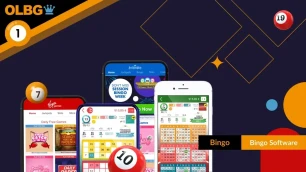
Top Online Bingo Software Platforms
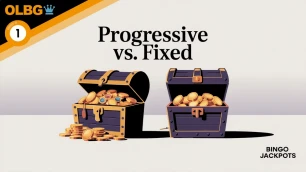
Bingo Jackpots Explained: Progressive vs Fixed
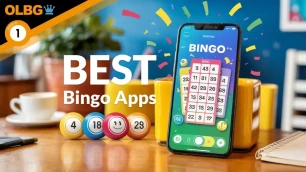
The Best Bingo Apps for January 2026
🎁 The Golden Years – Glamour, Prizes and Community Spirit
The ‘60s to the ‘80s were bingo’s heyday. Halls were buzzing seven nights a week. With cash jackpots, flashing lights and celebrity callers, it wasn’t just a game – it was a night out. Many people still fondly remember their local club, their favourite seats and the thrill of shouting “House!”
📉 Changing Times and a Digital Rebirth
While bingo remained beloved, the world around it shifted – and so did how people played.
🎮 The Decline of Traditional Halls
From the 1990s onwards, bingo halls faced stiff competition from new forms of entertainment: TV, the National Lottery, and changing social habits. Many iconic venues closed their doors.
Responsible Gambling Reminder
🌐 Online Bingo Changes the Game
In the early 2000s, the internet sparked a new era. Online bingo rooms launched with chat features, themed games, and community vibes that echoed the real-life experience – but from the comfort of your sofa.
📱Mobile Bingo and Modern Features
As smartphones became part of daily life, mobile bingo followed. With features like auto-daub, loyalty schemes, and 24/7 access, playing bingo became even easier – especially for women juggling work, family and me-time.
How the Game Has Changed (and What’s Stayed the Same)
Bingo has always been about simplicity and social fun – but the details have shifted:
- From 90-ball to 75-ball and beyond
- Paper cards to touchscreen daubers
- Community halls to virtual bingo chat rooms
- Cash prizes to bingo bonuses and bingo loyalty schemes
Despite all that, the heart of bingo – a shared moment of joy – remains the same.
🌟 A British Icon – Bingo in Pop Culture
From classic catchphrases like “two little ducks” to bingo-based TV segments, the game is part of British pop culture. It’s featured in sitcoms, soaps, and pub quizzes – always with a wink and a laugh.
Even celebrities like Barbara Windsor and Peter Kay have paid homage to its charm.
Final Thoughts
Bingo’s journey from dusty halls to digital rooms is a uniquely British story – one of resilience, reinvention, and community.
Whether you're chasing nostalgia or discovering it for the first time, bingo has a place for you.
This article was written by me – Jenny Mason, OLBG’s bingo specialist – and fact-checked by Sam Darkens for accuracy and clarity.
FAQ
History of Bingo FAQs
Where did bingo originate?
Bingo originated in 16th-century Italy as a game called Il Gioco del Lotto d’Italia. It spread across Europe and was adapted in France and Germany before being introduced to the United States, where it evolved into the version we recognise today.
How did bingo become popular in the UK?
Bingo gained popularity in the UK during the 1940s, particularly during WWII, when it was played in church halls and community centres. Its real explosion came in the 1960s, when legal changes allowed commercial bingo halls to operate, making it a mainstream pastime.
Was bingo played during the war?
Yes – bingo, often called housey-housey, was played during WWII in Britain. It was used to raise morale and funds for the war effort and became a popular form of low-cost entertainment in forces clubs and church halls.
What was bingo called before it was legalised?
In the UK, it was commonly referred to as housey-housey before becoming officially regulated as bingo. The name “bingo” itself became more widespread after commercial halls adopted the Americanised branding in the 1960s.
When did commercial bingo halls start appearing?
Commercial bingo halls began appearing across the UK in 1961, following the 1960 Betting and Gaming Act. Many old cinemas and theatres were converted into bingo venues almost overnight, and it became a national craze.
Why did bingo halls decline?
Bingo halls started to decline from the 1990s onwards due to competition from television, the National Lottery, changes in leisure habits, and the rise of online entertainment. Smoking bans and economic shifts also impacted attendance.
How has online bingo changed the game?
Online bingo has made the game more accessible, flexible and social. Players can now enjoy themed rooms, chat functions, loyalty schemes and auto-daub features, all from home or mobile. It’s brought a new generation into the fold while keeping the community feel alive.
Are modern bingo sites safe to use?
Yes – as long as you stick to UK-licensed sites regulated by the UK Gambling Commission. These sites must follow strict rules around fairness, data protection, and responsible gambling tools.
What’s the difference between 75-ball and 90-ball bingo?
90-ball bingo, the most popular format in the UK, uses cards with 15 numbers and three ways to win. 75-ball bingo, more common in the US, has a single pattern to complete on a 5x5 grid. Both offer fun, but the style and pace differ slightly.
Why do UK players love bingo so much?
Bingo is part of British culture – it's social, affordable, and easy to play. Whether it’s in a lively hall or an online chat room, it brings people together and offers a chance to unwind and win small treats or bigger prizes.
What bingo terms come from British slang?
Many number calls use classic British rhymes or slang, like “two little ducks” (22), “legs eleven” (11), or “top of the shop” (90). These phrases are part of what makes UK bingo so charming and nostalgic.
Can you still play bingo in-person in the UK?
Yes, although fewer than in the past, bingo halls still operate across the UK – especially under brands like Mecca and Buzz. Many players now switch between in-person sessions and playing online, depending on mood and convenience.
